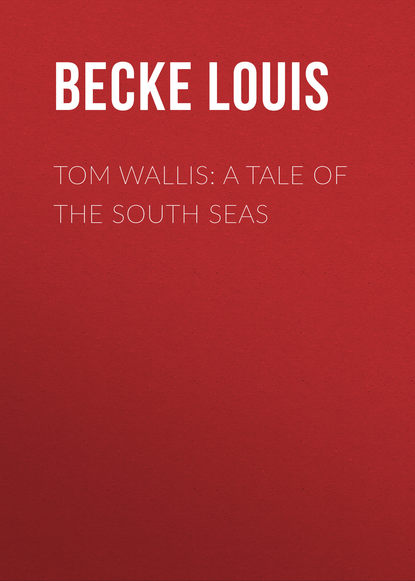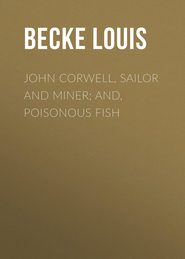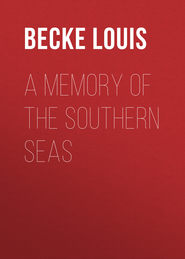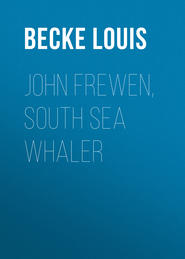По всем вопросам обращайтесь на: info@litportal.ru
(©) 2003-2024.
✖
Tom Wallis: A Tale of the South Seas
Настройки чтения
Размер шрифта
Высота строк
Поля
The grave-faced young mate nodded, sat down beside the lad on the edge of the skylight, and taking Tom's hand out of the sling, began to unwind the bandages from his fingers, which he examined critically, and, pressing them carefully, asked the lad if he felt much pain.
'No, sir,' said Tom, lying manfully, as he looked into the officer's eyes-so calm, patient, and quiet, like those of his own father-'not much.'
'Then we'll have these off,' said Collier, as with a kindly smile he unfastened the bandages; 'but you won't be able to use that foot for another week or two.'
'I don't know how I managed to cut it,' said Tom, as he lay back with a sigh of relief, and watched the brig's royalmasts make a sweeping arc through the air as she rolled from side to side. 'I put on my boots when I came to the rocks beyond Misty Head.'
Captain Hawkins laughed. 'You was non compos mentis of the first class and stark naked in a state of noodity, and when we saw you spread-eagled as it were on the beach, and put ashore to see whether you were dead or alive we couldn't see a stitch of clothing anywhere, could we, William Henry?'
The Maori helmsman nodded his head affirmatively, and then, as eight bells were struck, and he was relieved at the wheel, he came and stood beside the master and mate, and a pleased expression came into his somewhat set and heavy features when Tom put out his hand to him.
'It was you who saw me first, and saved my life, wasn't it?' he said; and then with boyish awkwardness-'I am very much obliged to you, Mr. William Henry.'
The big half-caste took Tom's hand in his own for a moment, and shuffling his bare feet, muttered in an apologetic tone that 'it didn't matter much,' as he 'couldn't help a-seeing' him lying on the beach. Then he stood for'ard.
'Do you know who he is, young fellow?' said the skipper, impressively, to Tom, as soon as the big man was out of hearing.
Tom shook his head.
'That's Bill Chester, William Henry Chester is his full name he's the feller that won the heavy-weight championship in Sydney two years ago didn't you never hear of him?'
Tom again shook his head.
'Well you know him now and it'll be something for you to look back on when you comes to my age to say you've shook hands with a man like him. Why he's a man as could be ridin' in his own carriage and a hobnobbin' with dukes and duchesses in London if he'd a mind to; but no he ain't one of that sort a more modester man I never saw in my life. Why he stood his trial for killin' a water policeman once and only got twelve months for it the evidence showin' he only acted in self-defence being set upon by six of them Sydney water police every one of 'em being a bad lot and dangerous characters as I know; and the judge saying that he only stiffened the other man under serious provocation and a lenient sentence would meet the requirements of the case; seventeen pound ten me and some other men give the widow who said that she wished it had happened long before and saved her misery he being a man who when he wasn't ill-usin' sailor men was a-bootin' and beltin' his wife eleven years married to him although he was in the Government service I'll tell you the whole yarn some day and… Now then where are you steerin' to? I don't want you a cockin' your ears to hear what I'm sayin'. Mind your steerin' you swab an' no eaves-droppin' or you'll get a lift under your donkey's lug.'
The man who had relieved 'William Henry'-a little, placid-faced old creature, who had sailed with Hawkins ever since that irascible person had bought the Lady Alicia when she was lying in Port Phillip, deserted by her crew, twenty years before, said, 'Ay, ay, sir,' and glued his eyes to the compass-although he had no more intention of listening to the skipper's remarks than he had of leading a mutiny and turning the brig into a pirate. He had been threatened with fearful physical damage so often during his score of years' service with the boisterous old captain, that had it been actually administered he would have died in a fit of astonishment, for 'old Sam' had never been known to strike one of his hands in his life, although he was by no means averse, as mentioned above, to displaying his pugilistic qualifications on shore, if any one had the temerity to make derogatory remarks about his wonderful old brig.
Swelling with importance, the old man, after glaring at the man at the wheel for a moment or two, turned to the mate-
'Mr. Collier this young person being an infant in the eyes of the law and this ship being on Government service and to-day being his convalescency as it were I shall require you to verify any or whatsoever statements as shall appear to be written in the log of this ship. I know my duty sir and I hereby notify you that I rely on you to assist and expiate me in every manner;' and the fussy little man waddled down the companion way with a kindly nod at Tom.
Tom began to laugh. 'He talks something like old Foster, Mr. Collier-the old man I was telling you about.'
The mate smiled. 'He's a good old fellow, my lad, good, and honest, and true; and now that he is out of hearing, I may tell you that, ever since you were brought on board he has studied your comfort, and has never ceased talking about you. Three days ago, when you were able to talk, and tell us how you came to be where we found you, he was so distressed that he told me that he was more than half inclined to turn the brig round and head for Sydney, so that you might be enabled from there to return to your father.'
Tom's eyes filled at once. 'My poor father! He will never expect to see me again;' and then, as his thoughts turned to home and all that was dear to him, he placed his hands over his face, and his tears flowed freely.
The officer laid his hand on his shoulder. 'Try and think of the joy that will be his when he sees you again, Tom. And, above all, my dear boy, try and think of the mercy of Him who has spared you. Try and think of Him and His goodness and-'
He rose to his feet, and strode to and fro on the poop, his dark, handsome features aglow with excitement. Then he stopped, and called out sharply to a couple of hands to loose the fore and main royals, for the wind was now lessening and the sea going down.
Ten minutes later he was again at Tom's side, his face as calm and quiet as when the lad had first seen it bending over him three days before, when he awoke to consciousness.
'I promised you I would tell you the whole yarn of your rescue. There is not much to tell. We were hugging the land closely that day, so as to get out of the southerly current, which at this time of the year is very strong. We saw the fire the previous night, when we were about thirty miles off the land, and abreast of Port Kooringa. Then the wind set in from the north-east with heavy rain-squalls, so the skipper, who knows every inch of the coast, and could work his way along it blindfolded, decided to keep in under the land, and escape from the current; for the Lady Alicia'-and here his eyes lit up-'is not renowned for beating to windward, though you must never mention such a heresy to Captain Hawkins. He would never forgive you. About four o'clock in the afternoon we went about, and fetched in two miles to the northward of Misty Head; and Maori Bill, the man who was here just now, and whom the skipper calls "William Henry," cried out, just as we were in stays again, that he could see a man lying on the beach. The captain brought his glasses to bear on you, and although you appeared to be dead, he sent a boat ashore. There was a bit of a surf running on the beach, but Harry took the boat in safely, and then jumped out, and ran up to where you were lying. He picked you up, and carried you down to the boat-you were as naked as when you first came into the world, Tom, – and then brought you, just hovering between life and death, aboard. Your left foot was badly cut, left hand swollen and helpless, and, worse than all, you had a terrible cut on the back of your head. And here you are now, Tom, safe, and although not sound, you will be so in a few days.'
Tom tried to smile, but the old house at Port Kooringa, and the sad face of his heart-broken father, came before his eyes, and again his tears flowed, as he thought of the anguish of those he loved.
'Oh, Mr. Collier, that day was the happiest day of my life! When I was riding along the beach, I felt as if I was moving in the air, and the sound of the surf and the cry of the sea-birds … and the wavy, round bubbles that rose and floated before me in the sunshine over the sand … and I was so glad to think that I could tell father and Jack about Foster and I going out in the boat to the shipwrecked sailors, and bringing them ashore. And I'm so sorry for being so foolish as to light a fire on Misty Head, when the country was so dry. Poor father, I wish I could tell him so now! Of course he will think I am dead;' and, in spite of himself, his eyes filled again, as he thought of his father's misery and worn and haggard face.
'Don't fret, my boy. It cannot be helped. And any day we may speak a ship bound to Sydney or Melbourne, in which case you will soon be back home; anyhow, the Lady Alicia should be in Sydney Harbour in four months from now.'
Then the mate gave Tom some particulars about the nature of the voyage. The brig was really, as the captain had said, on Government service, having been chartered by the New South Wales authorities to convey a boat to Wreck Reef-a dangerous shoal about two hundred miles north-east of Sandy Cape, and the scene of many disastrous wrecks. The boat, with an ample supply of provisions and water, charts and nautical instruments, and indeed every necessary for the relief of distressed seamen, was to be placed under a shed on an islet on the reef, where it would be safe and easily visible. During the past four or five years, so the mate said, several fine ships had run ashore, and the last disaster had resulted in terrible privations to an entire ship's company, who for many months had been compelled to remain there, owing to all the boats having been destroyed when the vessel crashed upon one of the vast network of reefs which extend east and west for a distance of twenty miles.
From Wreck Reef the brig was to proceed to Noumea, in New Caledonia, where she had to discharge about a hundred tons of coal destined for the use of an English gunboat, engaged in surveying work among the islands of the New Hebrides group.
'So you see, Tom,' added Mr. Collier, 'there's every probability of your seeing something of the South Sea Islands-if New Caledonia may be called one. We were there last year on the same errand, carrying coal for the naval people-in fact, old Sam always gets a charter of this sort; he is well known to them all, and although he is not much of a navigator, a better sailor man never trod a deck; and, in spite of the brig being a slow sailer, she is, like her master, always to be depended upon. I have been with him now for more than three years, and during that time we have had several Government charters, of which the old man is very proud of speaking. He has many little vanities, which you must take care not to offend: one is that the brig is a remarkably fast sailer; another is his harmless habit of exaggerating her performances to any stranger whom he may meet; another is that those four old useless six-pound carronades which lumber up the main deck are likely to be of immense service to the colony of New South Wales, should the Russians ever make a descent on Sydney Harbour. They were in the brig when he bought her-she once carried ten such popguns-when she was employed in the China Seas, and I believe had occasion to use them more than once. However, if you want to please him, just ask him one day to let the crew go to quarters for gun-practice. The magazine is in the lazarette-you'll see the hatch just under the cabin table, – and every two weeks he has what he calls an inspection: there's enough round shot down there to load a ten-ton cutter. There really was a Russian scare in Sydney some years ago-long before I joined the brig, before you were born, in fact; and old Sam went mad with delight when the Governor hired the Lady Alicia, to cruise up and down the coast to watch for the hostile fleet. However, he'll tell you all about it some day. But about the most amusing of his eccentricities is this-whenever we are entering port he likes to do so in style, and nearly drives the crew and myself crazy by rigging stunsail gear, and crowding the old ship with unnecessary and useless canvas; but he really believes that his friends are eaten up with jealousy at the fine appearance he imagines she presents. But there, I must leave you now.'
Presently the skipper's head appeared again.
'My boy me and Mr. Collier and the second officer as is customary shortly after noon take refreshment; will you take a glass of Madery which I can recommend being a consistent invidel myself for many years with liver.'
'Thank you, sir,' said Tom, as the kind old fellow brought him a glass of very good Madeira indeed, and watched him drink it. Then the skipper bustled below again, to take his mid-day tot of brandy-and-water with his officers.
CHAPTER V
THE CAPTAIN OF THE BANDOLIER
Nearly two long months had passed since Tom had lit that fateful fire on Misty Head, and Mr. Wallis, his hair somewhat greyer, and his face more deeply lined, was sitting with the captain of the Bandolier upon the grassy side of the bluff overlooking the bar. Both were smoking, and watching the figures of Jack and the little girl, who were on the beach below, Jack fishing, and the child wandering to and fro, busied in picking up seaweed and shells, and running up every few minutes to show them to the lad. Away to the northward, the headlands showed grey and soft through the misty sea haze which floated about the shore, and as Mr. Wallis let his gaze rest upon them, he leant his face upon his hand, and sighed heavily.
'Wallis,' said the seaman presently, and speaking in a low voice, as he resumed the desultory conversation they had begun when they first sat down on the bluff to wait until Jack and little Nita returned to them, 'I want you to believe me when I say that there is not an hour of my life in which I do not feel that but for me this heavy blow would never have fallen on you.'
'Do not say that, Casalle. It was to be, and you do wrong to reproach yourself for the calamity with which it has pleased the Almighty to afflict me, and for which you are in no way responsible. And your sympathy has done much to help me. Heavy as is the sorrow which has come upon us both, we should yet reflect that we have no right to cry out in bitterness of spirit: for even though your wife was taken from you in that night of horror with awful suddenness, your little one was spared to comfort you; my boy was taken from me, but his brother is left. And as time goes on we shall begin to understand, Casalle, and even the dreadful manner of their deaths will in God's own time cease to be such an ever-present and heart-breaking reflection as it is to us now.'
The master of the Bandolier made no answer. He had not that hope which to some men is a source of such sublime strength, when all the sweetness and joy and sunshine of life is snatched suddenly away, and the whole world becomes dark to the aching heart. But although he made no response to his companion's fervid speech, he felt its truth, and envied him the possession of such a deep-seated fount of calm, unquestioning faith.
During the two months that had elapsed since he and his men had landed at Port Kooringa, a warm feeling of friendship had grown up between him and his host; and now that the time was drawing near for them to part-for he was to leave the quiet hospitable house under the bluff on the following day-he had tried to express his gratitude for the unceasing kindness and generosity which he, his child, and his officers and men had received at the hands of the owner of Kooringa Run.
Presently Wallis rose. 'Come, let us go down to Jack and Nita. They have forgotten our existence, I believe; Jack is too busy pulling in whiting and sea-bream to even turn his head to see where we are, and Nita won't leave him, you may be sure.'
Casalle laughed softly. 'Yes, they get on well together, don't they? I wonder how long it will be before I see her again,' he added wistfully.
'Not very long, I hope,' said the squatter, cheerfully, 'not long-for all our sakes. And, although I know what a wrench it will be for you to leave her, I am sure you are doing wisely in giving her to us until she is old enough to manage your house in Samoa, when you give up the sea altogether, and settle down a prosperous planter. And I do not think that you will be long absent from her at a time. I shall certainly expect to see you again in less than two years.'
The captain shook his head. 'I lost all I had in the world in the Bandolier, except her insurance. That will enable me to buy a small schooner to begin trading again; but I shall have to get long terms from the Sydney merchants for my trade goods. And I don't see how I am likely to see Kooringa again in two years-I'll have to make Samoa my headquarters for the next five, I fear.'
'My dear fellow,' said the squatter, 'you shall do no such thing-I mean that I am determined not to lose sight of you for five years. Make Samoa your headquarters if you will, but I might as well tell you now what I want you to do for me. I want you to let me be your banker. I am not a very wealthy man, but I can well spare four or five thousand pounds. And I have written to Sydney to have that sum placed to your credit in the Bank of Australasia. Look upon it, if you have luck in your trading ventures, as a loan; if, unfortunately, you should meet with further misfortune, consider it as a gift, given freely and with sincere pleasure by one friend to another. With this sum you can get at least one of the vessels you need, and have enough capital left to buy all the trade goods you require, and pay for them, instead of handicapping yourself by giving bills to the Sydney merchants. There is nothing more harassing and deterrent to a man's energies, than to know that his credit and reputation are in the hands of people thousands of miles away. Therefore, my dear Casalle, don't give a bill to any one. If you find that five thousand pounds will not pull you through, my agent in Sydney will come to your assistance… There, there, don't say another word. 'Twould be "a moighty poor wurruld, indade," as Kate Gormon says, if we can't help one another. And then I don't want you to touch the Bandolier's insurance money. A thousand pounds is not much; leave it to accumulate for little Nita. Then again, as to your crew's wages, which you were intending to pay out of the insurance-that is all settled too.'
The seaman's eyes filled. 'Wallis, what can I say? How can I tell you what I feel? I never had a friend in my life till I met you. My father, who was a native of Funchal, was killed in a boat accident when I was a boy of ten. He was a rough Portuguese whaler, and after his death my mother was left in poverty, and died when I was away at sea, on my first voyage. My one brother, who was seven years older than me, also went to sea. I have never seen him since, but heard that long after he had passed as second mate, he returned to our native island, only to find that our mother was dead, and that I had gone. Until I met my wife, who was a native of the New England States, I led the wildest, the most dissolute-'
The master of Kooringa held up his hand. 'Never mind that, old man. There are not many-men such as you and I, wanderers on the face of the earth-who can show a clean sheet. Like you, I was sent out into the world when a mere boy; but I was less fortunate than you, for instead of a life of honourable hardship, I was led to look forward to-by my parents' influence-to one of ease. You, perhaps, were driven to dissipation when on shore, by the rough life of a whaleship's fo'c'sle. I led a dissipated and worthless existence, because I was cursed with ample funds, and but few of my many associates in India, during all the time I was in the Company's service, had any other thought but of leading a short life and a merry one, or else making as much money as possible and returning to England to live upon it. And like you, a good woman came to my rescue. Now, my dear fellow, let us say no more on this subject. Come, let us see what Jack has caught.'
Too overcome to find words to express his gratitude for such unlooked-for generosity from a man who, two months before, had been an utter stranger, the captain could only wring his companion's hand in silence.
In another day or two he would have to say good-bye to little Nita and the master of Kooringa; for the antiquated paddle-wheel coasting steamer William the Fourth, which called at Port Kooringa every three months, was then in harbour loading with hides and timber for Sydney, and he had taken passage by her. Brooker, the chief mate, and the whole of the crew, had preceded him some weeks by a sailing vessel, and were awaiting him in Sydney, for no one of them but wanted to sail with him again-and indeed the feeling that existed between captain and crew was something more like comradeship than aught else.
But here I am again, drifting away to leeward, and never a word about the Bandolier herself, and how she came to such mishap, and what happened between the time of that unlucky fire and now-when the two men and Nita and Jack are walking slowly home to spend their last night together in the old house which faced the restless bar.
* * * * *











